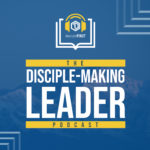
On this episode of The Disciple-Making Leader Podcast, Craig Etheredge and Glenn Underhill discuss developing a disciple-making pathway. They emphasize the importance of following Jesus’ examples and the phases he moved people through, and how their church evaluates all their ministries against this pathway to ensure well-disciplined leaders. They talk about the importance of both discipleship pathway and leadership pipeline in developing disciples and disciple makers. They also discuss the lack of a clear understanding of the chronology of Jesus and introduces the concept of a harmony of the Gospels. Later, they discuss Jesus’ four invitations to his disciples that represent a pathway for disciples’ development. Finally, they talk about the importance of proper training and equipping before going on missions, and the significance of the “grow up phase” or being part of a high-accountability group that trains and equips individuals.
Overview:
- [00:00:21] Developing a disciple-making pathway is crucial.
- [00:03:33] Make leaders by defining discipleship pathways intentionally.
- [00:07:40] Jesus’ four invitations for discipleship summarized.
- [00:10:29] Jesus’ chronology unclear; harmony of Gospels used.
- [00:16:00] “Discipleship and leadership pipeline strategy explained visually.”
- [00:19:07] Galilean boys seek John the Baptist, find Jesus.
- [00:22:39] Jesus calls disciples to follow Him.
- [00:26:13] Church needs to help connect with community.
- [00:30:18] “Discipleship phase: accountability, training, multiplying growth”
- [00:34:07] Prepare well before you go abroad.
- [00:36:48] Jesus fixates on the cross and multiplication.
- [00:39:19] Importance of spiritual pathway for church leaders.
- [00:44:10] Disciple making leaders pipeline upcoming episodes.
Discussion Questions:
- What are the four phases that Jesus used to develop his disciples as ministry and movement leaders, according to the speaker, and why are they important to understand in the context of discipleship?
- How does the concept of a “disciple-making pathway” help churches to evaluate and track the progress of individuals in their spiritual development, and why is this approach important to effective ministry?
- What are some of the challenges that church leaders face in developing a clear and effective leadership pipeline, and how can these be overcome to ensure that leaders are well-discipled before assuming positions of authority and responsibility?
- How can churches better engage with non-believers and help them to cross the “faith line,” and what strategies can be used to ensure that these individuals become fully integrated into the church community?
- Why is it important for individuals to receive proper training and equipping before going on missions or assuming leadership roles, and what fundamental skills should they be equipped with in advance?
- How does the example of Jesus and his development of his disciples provide a useful model for churches to follow when training and equipping leaders, and what practical steps can they take to adopt this model?
- What is the role of basic training in the army before deployment, and how can it be applied to spiritual development and discipleship within the church?
- Why is it important for leaders to invest in others and disciple them, and what are some of the common reasons why leaders resist doing so?
- What is the “connect phase,” according to the speaker, and how does it fit into the overall disciple-making pathway that churches should use to guide the development of their members?
- How can churches create small, high-accountability groups that train and equip individuals for the “grow up phase” of spiritual development, and what are some of the benefits of this approach to discipleship?
